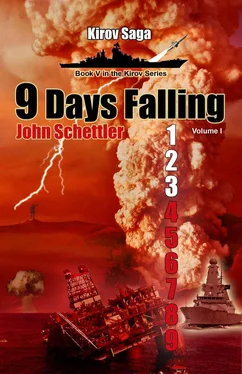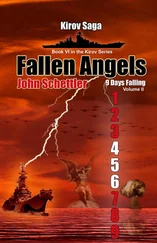Now, a little over a month later, things were all getting very strange on the geopolitical chessboard and Elena Fairchild was a bit edgy about it all. The Chinese engagement with the Japanese over the disputed Senkaku Islands had led to an alarming escalation in the Pacific. The sudden sharp conflict at sea had ended with a barrage of six ballistic missiles at Naha airfield on the Japanese island of Okinawa. Since then a grim silence had fallen over the scene, but Fairchild knew things were not so simply resolved in this volatile region. Elsewhere in the world tensions were rising to the near boiling point in many other traditional flashpoints. Her latest Intel was quite disturbing.
Russia, now firmly in the newly formed SinoPac alliance, had maneuvered to influence oil and gas operations in Central Asia as its first priority. When the US pushed for a planned new pipeline through Azerbaijan, shipping arms to Georgia in exchange for pipeline easements, the scale of the Russian response was quite telling. Russian intelligence was still potent, and the 58th Army had been put on alert, ordered to move rapidly with elements of the 20th Guards, and 19th and 42nd Motor Rifle Divisions. These forces were joined by units of the Russian 76th and 98th Airborne Divisions and the 45th Spetsnaz, a special operations reconnaissance regiment. Some of these forces, including a full Motor Rifle Division, were poised at the northern border of Kazakhstan.
The US had nothing in the region but a single ready brigade way off in Kuwait, and even that was merely the equipment for this brigade, and not the personnel. Now the Americans had come to regret their bumbling about in Afghanistan, a long twelve year presence that had left them with nothing but thin promises for basing rights that had evaporated three years after the last combat troops were pulled out. So when the Russians posed a real threat in the Caucasus what could the Western Alliance do?
Damn, thought Elena, Russia was back on the high seas, and the two great powers were back to their old games again, both flexing their muscles with “planned” military exercises and a lot of threatening press on both sides. The stakes could not be higher, particularly with China and Japan at each other’s throats and a big stink in the UN now that had escalated to threats against Taiwan. In this climate, Elena Fairchild, like any good mother, wanted all her children closer to home.
Of her five remaining tankers, one was home at Milford Haven getting ready for the next contracted haul. Three more were nearing Cyprus, due here tomorrow for a special mission—if all went as she hoped it would tonight. All her Persian Gulf contracts were tabled now, except the crown jewel of her fleet, the Princess Royal , her largest ship. The Ultra Large Crude Carrier was still in the Persian Gulf, laden with oil that would secure a good chunk of her financial situation for the foreseeable future.
She was thinking about picking up something new tonight, the icing on the cake Princess Royal carried, perhaps a quick relief run to American ports if Europe had any stores of gasoline they might release. There might be oil credits bunkered in Ceyhan that would lead to conveyance contracts, and she expected this was what Salase was here to offer her. With empty tankers already at sea, she’d be three days ahead of the competition in any such venture. She could get to the oil first, and being first on the scene with ample resources, in war and in business, had some very real advantages.
The situation in the Persian Gulf also prompted her to immediately recall her last oil tanker there, the Princess Royal was all of 400,000 tons, the weight of four Nimitz class aircraft carriers, and capable of transporting three million barrels of oil in a single haul. The ship was now outward bound to the straits of Hormuz, pregnant with crude worth nearly half a billion dollars at current market prices, which were only likely to go higher. It was a bad time for any shenanigans in the Gulf. She had bank notes due on the Argos Fire refit at the end of the month. Credit was very tight on the world market, and she knew there would be no way the Bank of London would extend. She had to come up with a cool $700 million cash for Argos Fire, and more than half of it was riding in the belly of Princess Royal. She needed that last forty percent, and tonight she would set the Argos Fire on a quest for that golden fleece—oil.
Stupid to leave my big lady alone like that with Argos at home for replenishment, she thought to herself. Stupid not to take the Intel briefings seriously on the Gulf. Israel was again flying maneuvers over Lebanon. She wouldn’t put it past the Israelis to strike out on their own against Iran at any time now. The whole damn show over Georgia was also as much about Iran as anything else, she knew. Iran and the oil. Damn, she thought, I should have had Argos Fire down through Suez weeks ago to keep watch on Princess Royal. Very stupid move on my part.
“So what is the situation up north, Mr. Salase?”
“A little bad weather,” said Salase, smiling broadly, nose flaring. He was referring to the recent outbreak of violence in the North Caspian.
“Bit of a squall?” she probed innocuously.
“Perhaps something more.”
Elena Fairchild, simply smiled at the ante, calling her guest at once. Salase glanced at the Captain, unaware of his status as a member of the company’s inner circle, and not knowing if he was to be privy to the information he might now disclose.
“I assure you, we are all friends here,” she said, settling the matter. Salase smiled, nodding to the Captain, who returned a polite smile as he folded his hands, listening attentively.
“In fact, let’s speak plainly, Mr. Salase,” said Fairchild, the light of the chase in her eyes. “What does the weather forecast have in it that I should be concerned about this evening?”
“Opportunity, perhaps,” said Salase. “Lots of trouble in the Region. Several factions are vying for power in Kazakhstan. A bit of the blood feud between them, but all set aside when there are so many Western interests to feed on. Not to mention the fact that the Russians are sitting on the northern border like a pack of wolves.”
“Indeed,” said Elena. “Enlighten me.”
Salase smiled. “Contracts,” he said quietly. “Unexpected windfall in the storm, eh?”
Fairchild leaned forward, her chin resting on her palm, elbow on the table, in contravention of all good etiquette. Business was business, and they were only just starting to receive hors d'oeuvres. The main course would come in time. Salase wanted to nibble a bit, probably to see what percentages he could ferret. She would hear him out. He lowered his voice, glancing at the departing table servant.
“We heard something of interest,” he said, his accent heavy, yet engaging. “A lot of trouble in the region, and trouble in the Gulf as well—both Gulfs. Big storm hit Houston, big trouble brewing in the straits of Hormuz as well.”
That last bit got the attention of both Fairchild and MacRae, though the doughty lady showed no emotion on her face. The Captain’s mind went to the decrypt in his pocket. He had not found time to inform Miss Fairchild of the potential threat in the Persian Gulf.
“I don’t ship anything to Houston, my good man,” said Fairchild.
“At the moment…But you do ship from the straits of Hormuz to terminals that serve the US. You have a ship there now, eh? Big ship in a bad place.”
She smiled, waiting for him to make more of a point. Her worries over Princess Royal were in no way evident on her face.
“Well this business up north in the Caspian now,” Salase danced off in another direction. “The hurricane has everything shut down for the Americans. Always trouble, only this year a very bad late season storm. The refineries shut down, rigs were damaged; shortages will soon follow, and prices will spike. Going to be a lot of demand for quick deliveries to offset that shortfall. Oil supplies in Europe are very weak right now.”
Читать дальше












